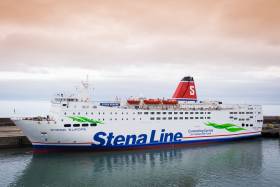Displaying items by tag: Refit H&W Belfast
Ship Strapline for Stena Europe A First for Irish Sea Ferry Fleet
#ShipStrapline - Stena Europe may be the oldest ferry in the operator’s Irish Sea fleet of seven ships, but the 1981 built vessel has emerged fresh from dry-docking as the first to sport a new livery strapline, writes Jehan Ashmore.
The ferry operating the Rosslare-Fishguard route now has large 30-foot ‘blue’ lettering emblazoned on the hull with the words: ‘Connecting Europe for a Sustainable Future’. Accompanying the strapline on either sides are overlapping waves painted in shades of ‘green’. The strapline is to reflect Stena Line’s commitment to becoming a more sustainable and environmentally friendly company, a key aspect of the company’s future business strategy.
The external livery work on Stena Europe was carried out during a refit at Harland & Wolff shipyard. The work in Belfast was managed by Stena Line’s group sister company, Northern Marine Ferries as part of an ongoing £7m fleet refit programme. A fleetmate, Stena Lagan is currently at H&W for a refit while off duty from the Belfast-Birkenhead (Liverpool) route. Taking her place is Stena Horizon which in turn has been displaced from Rosslare-Cherbourg service by relief ferry Stena Nordica, see related report.
Ian Davies, Stena Line’s Trade Director (Irish Sea South) commented: “We are delighted that one of our vessels has become the first Stena Line ship on the Irish Sea to promote our new company strapline which graphically reflects our increasing commitment to become a more sustainable and environmentally friendly company.
In addition to the exterior upgrades of the Stena Europe work was carried out on bow thrusters, rudders and main shaft seals under the water line. Additional upgrades applied to the galley, bar and crew accommodation.
To accommodate the increasing demand from the freight transport industry, Stena Line also increased the height to an area of the Stena Europe’s cargo deck.
The height clearance is 4.65m which is to handle all trailer height variations. This has allowed access to high top trailers, a key requirement of more freight customers operating between the UK and Ireland and for the company to expand the business in 2017.





























































